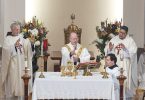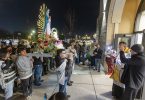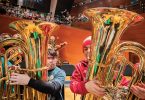by Joe Bollig
joe.bollig@theleaven.org
KANSAS CITY, Kan. — Keith Geary will — God willing, of course — be ordained a permanent deacon in about a year’s time. But already, people sometimes call him “Father.”
“People who come for a funeral or a rosary at a wake sometimes call me ‘Father,’” said Geary, a deacon candidate and member of Our Lady of Unity Parish in Kansas City, Kan. “I say, ‘No, I’m studying to be a deacon.’”
The confusion is understandable.
Geary and the 19 other archdiocesan deacon candidates sometimes assist their pastors at the altar or on other occasions. If parishioners see another man alongside their pastor, they assume that the other man must be a priest, too.
The Archdiocese of Kansas City in Kansas is one of the last American dioceses to introduce the permanent diaconate. Currently, there are only four permanent deacons in the archdiocese, and they’ve all moved here from other places.
The first archdiocesan permanent diaconate class, after a period of discernment, began formal classes almost five years ago. In January, members of the class began their final year of discernment, study and preparation. The class of 20 men will be ordained to the permanent diaconate on April 9, 2011, at St. Michael the Archangel Parish in Leawood.
They will be called “permanent deacons” because they will not — like our archdiocesan seminarians — continue on their road to the priesthood. The seminarians are, instead, ordained “transitional deacons,” since the diaconate is just a step toward holy orders.
The permanent diaconate is the third order of clergy in the Catholic Church. Every priest and bishop retains the powers of a deacon. During some liturgies, like ordinations, parishioners will see a priest of the archdiocese vested and acting in the role of deacon while his brother priests concelebrate the Mass.
This is very significant, because it demonstrates the importance of the permanent diaconate, which was revived after the Second Vatican Council, said Msgr. Gary Applegate, administrator of the archdiocesan permanent diaconate program.
The role of the permanent deacon at Mass, he said, also demonstrates the substance of the diaconate and the vital role and connection between the liturgical role of the permanent deacon and his ministries outside of liturgical functions.
The liturgy: An apex moment
The liturgical functions of all deacons — permanent or transitional — are the same.
They can baptize, bring the Eucharist to the sick and dying, witness marriages, officiate at funerals and burial services, proclaim the Gospel, preach, voice the needs of the people in the general intercessions at Mass, assist in the preparation of the gifts, and distribute the Eucharist.
The key to understanding the permanent diaconate is understanding how his ministry grows out of the Eucharist.
“The liturgy is the culmination point — an apex moment where we have a meeting with God, where we are praying through that moment in time,” said Msgr. Applegate.
The Mass is where we bring what we’ve done and what we have neglected to do, he said, and we receive the grace to go back out into the world to live our Christian way of life and be an example.
The deacon’s role is to symbolically emphasize these things . . . and more. During the Mass, the deacon represents the poor — the assistance they must receive, as well as the poor’s goals and dreams.
The core of the answer to the question “What is a deacon and what does he do?” can be found in the sixth chapter of the Acts of the Apostles.
There, we read how some widows and orphans were being neglected in the distribution of charity. To address the issue, the apostles created the office of deacon. Thus, the first seven deacons were chosen and commissioned.
This, in a nutshell, is what today’s permanent deacons are all about: assisting pastors and serving the poor — the poor who manifest their poverty in different ways. Service is a hallmark of the Christian faith, which is symbolized by the deacon.
“Any service at the Mass [the deacons] render is the culmination of all that service they have done,” said Msgr. Applegate. “At the parish, he should be in charge of some social and service programs a parish operates. He represents those poor who assistance is given to, and he brings their hopes, dreams, wants, needs and desires prayerfully to the Mass.”
The deacon: sign and instrument
The deacon has been describes as a “bridge” between the clergy and laity. Like clergy, they have liturgical roles and perform works of service, but they also can be married and work nine-to-five, just like Joe and Jane Average Catholic.
Most of our permanent deacons will not be engaged in full-time, paid ministry in the church. Some will, but most will continue to raise their families and work at their jobs.
As they do so, however, they will also fulfill their purpose of being role models, providing a moral and ethical voice in the workplace and other venues of everyday life.
Thus, a deacon is not only a sort of “bridge,” but also an efficacious sign and symbol.
“The deacons, even though they may be a paid employee of a parish, should have a parish or religious institution where they volunteer service time,” said Msgr. Applegate.
Where to go, what to do
The deacon candidates are facing their final year with a lot of hope and unanswered questions. Some of the most important to them personally will probably be: Where will I go? What will I do?
None of them have been assigned parishes or ministries yet, except for those who already serve.
“I’m like the other guys in the program,” said Geary. “I’d like to be assigned to my home parish, but we will be servants of the archdiocese. We will go wherever we are sent.”
Despite the unknowns, they’ve reached a comfort level with that.
“[Our knowledge and faith] is at that level now where we know what we don’t know, but we’re much more comfortable with that,” said Mark Stukel, permanent deacon candidate and a member of St. Michael the Archangel Parish in Leawood.
The archdiocese will take into account the job and family obligations of deacons when they are assigned. In urban areas, for example, the deacons will serve at a parish for a while and then be transferred — just like pastors — to another parish within a reasonable driving distance.
This will have little to no impact on their family life or employment.
In rural areas, on the other hand, a permanent deacon might serve in a rural parish for one weekend a month, perhaps to do some administrative work or do sacramental preparation, and thus lighten the pastor’s workload.
“We [deacon candidates] each had a 30-minute private conversation with the archbishop, and he talked with us about what kind of assignments we’d like,” said Geary.
“So, the archbishop is very aware of our needs as family men trying to do the best we can to [integrate] our lives and ministry as a deacon,” he continued. “He’s very understanding and knowledgeable about how important the family aspect is for the deacon.”
The archbishop has made it very clear that it’s not his intention to uproot families to reassign permanent deacons, said Stukel.
“He has asked us many times, ‘What is your desire?’ and [told us] that he would accommodate it the best he could,” said Stukel.
Their service to the poor will take them in a lot of directions — literally and metaphorically — that they never anticipated, said Stukel.
“That’s what the diaconate was designed for,” he said. “We will be serving in the world.”
One of the challenges that awaits them will be educating laypersons and pastors about what is the role of the permanent deacon. Some people, when they explain that they aren’t and will never be priests, simply say, “Oh.” Sometimes, they want to know more.
“It will just take time,” said Stukel. “Our actions and our presence will, hopefully, be the best educational tool.”
So far, the permanent deacon candidates have gotten tremendous support from pastors and parishioners alike. Often, they will be told that others are praying for them. This is what the deacons want.
“I’d like to ask the people of the archdiocese to continue to pray for us as a group still in formation and ask the Holy Spirit to guide us in our decisions and ministry as we near ordination,” said Geary.






